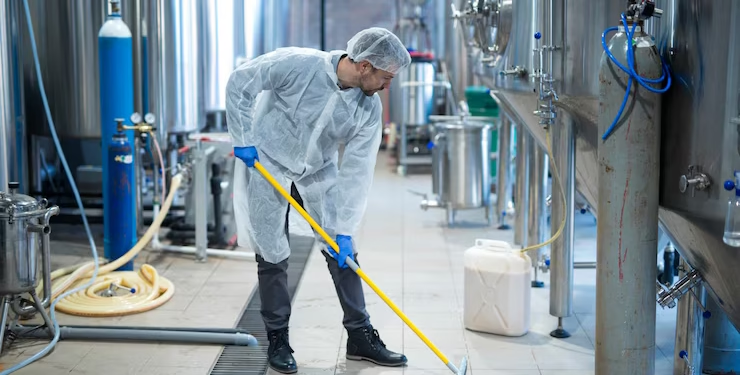Imagine this: It’s a typical Tuesday at your Melbourne warehouse. The forklifts are humming, orders are flying out the door, and someone’s even put on the kettle. Then—clang!—a drum topples over, releasing a slow, sinister ooze of chemicals onto the concrete floor.
Cue chaos.
Staff cough and scatter. The air stings your nose. Someone fumbles for the emergency binder—only to find it’s last been updated when flip phones were still a thing.
If that scenario gave you a sinking feeling, it’s probably time to talk seriously about Chemical Spill Control. Because in a city as bustling and industrial as Melbourne, spills aren’t an “if”—they’re a “when.” And the only thing worse than a spill… is being unprepared for one.
Spills Happen: The Real Cost of Unpreparedness
Melbourne isn’t just famous for laneways, lattes, and footy—it’s also a hotspot for industry. From bustling ports to pharmaceutical labs and bustling breweries, this city thrives on chemicals. And when those chemicals end up in the wrong place, the consequences can be messy, expensive, and dangerous.
Without a Chemical Spill Control plan, businesses risk:
- Worker injuries or illnesses
- Equipment and property damage
- Environmental damage (hello, contaminated soil and waterways)
- Fines that’ll make your accountant cry
- Community backlash and PR nightmares
And yet, many businesses are still rolling the dice, hoping disaster doesn’t knock at their roller door. Spoiler alert: Hope is not a strategy.
The Law Has Something to Say About That
Let’s get legal for a moment. In Victoria, if you store, transport, or use hazardous substances, you are legally required to plan for spills. Here’s what you’re up against:
Work Health and Safety Regulations
These demand that you manage risks to your workers. That means safe chemical storage and an actionable Chemical Spill Control procedure.
EPA Victoria – The General Environmental Duty
Under the Environment Protection Act 2017, your business must prevent harm to the environment “so far as reasonably practicable.” That includes… yep, spills.
Dangerous Goods Act 1985
Handle dangerous chemicals? Then a spill plan isn’t a “nice to have”—it’s the law.
Industry Codes of Practice
From transport to biotech, industry-specific standards raise the bar even higher. Fall short, and you could lose licences or face legal action.
So no, having a dusty spill kit in the corner doesn’t cut it anymore.
What Happens Without a Plan? Spoiler: Nothing Good
If you’ve ever dealt with a spill, you know it’s not just about grabbing a mop and hoping for the best. It’s about:
- Reacting fast
- Knowing who does what
- Having the right tools on hand
- Keeping people and the planet safe
Without a plan, even a minor spill becomes a big drama. Think: emergency call-outs, operational shutdowns, irate customers, skyrocketing insurance premiums… and regulators knocking on your door.
Crafting a Spill Plan That Works (and Gets Used)
Designing a Chemical Spill Control plan isn’t about filling out a form—it’s about building muscle memory. When a spill happens, your team needs to spring into action like a well-rehearsed dance.
1. Map the Danger Zones
Start with a chemical inventory. What are you storing? Where? In what quantities? Understand their properties—is it corrosive, flammable, reactive?
2. Assign Clear Roles
From “evacuate the area” to “deploy the spill kit,” every action should have a name beside it. Consider creating a “Spill Response Squad” with designated training.
3. Step-by-Step Response Guides
Think of it like a recipe for chaos control:
- Stop and contain the spill.
- Evacuate if necessary
- Gear up with PPE
- Neutralise or absorb
- Clean, decontaminate, and dispose safely
- Report and review
4. Location, Location, Location
Your spill kits and PPE must be visible, accessible, and readily available. Don’t bury them in the back shed behind the Christmas decorations.
5. Keep Everyone in the Loop
A response plan is useless if no one knows it exists. Run drills. Hold toolbox talks. Stick laminated guides near high-risk zones. Knowledge saves lives.
6. Document Everything
From the spill size to the cleaning agent used, from EPA notifications to photos of the scene—document it all. This protects your business and helps refine future response plans.
Melbourne’s Weather and Urban Sprawl: Extra Complications
Melbourne’s not-so-charming habit of turning four seasons into one day creates unique challenges for Chemical Spill Control. Rain can quickly carry chemicals into stormwater drains—straight into rivers, parks, or residential zones.
Heatwaves increase the volatility of stored chemicals, turning a small leak into a fire risk. High-density industrial zones can amplify the impact, affecting neighbouring businesses or homes. This means your spill plan needs to be more than generic—it needs to be Melbourne-smart.
Why Go Pro? When to Call in the Experts
DIY cleanup might work for small spills—but once you’re dealing with large volumes, reactive substances, or contaminated surfaces, it’s time to bring in the cavalry.
Melbourne’s professional Chemical Spill Control services can provide:
- 24/7 emergency response
- Industrial decontamination
- EPA-compliant waste disposal
- Post-incident reporting for regulators
- Preventative site audits and training
They’ve got the gear, the know-how, and the certifications to handle situations that are out of your league.
Your Plan is Your Insurance Policy (and Your Reputation)
A spill doesn’t care how busy you are or how much that delivery needs to go out. It’ll happen when it wants—and your only weapon is preparation.
A well-crafted Chemical Spill Control plan helps you:
- Stay on the right side of the law
- Protect your team and the environment
- Maintain your operating licence
- Preserve your brand reputation
- Sleep better at night
Because let’s face it—spills are scary. But not being ready? That’s terrifying.
Final Thought: Don’t Wait for the Spill to Spill the Truth
The actual value of a spill plan isn’t in how often you use it—it’s in knowing you can. In Melbourne’s dynamic industrial scene, Chemical Spill Control services from Akuna Services is every business’s secret weapon against chaos.
So, ask yourself: If a spill were to happen today, would your team be ready? If not, there’s no better time to start than right now.







